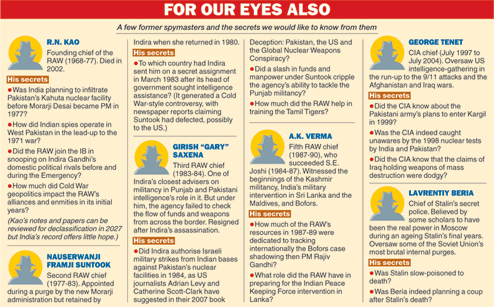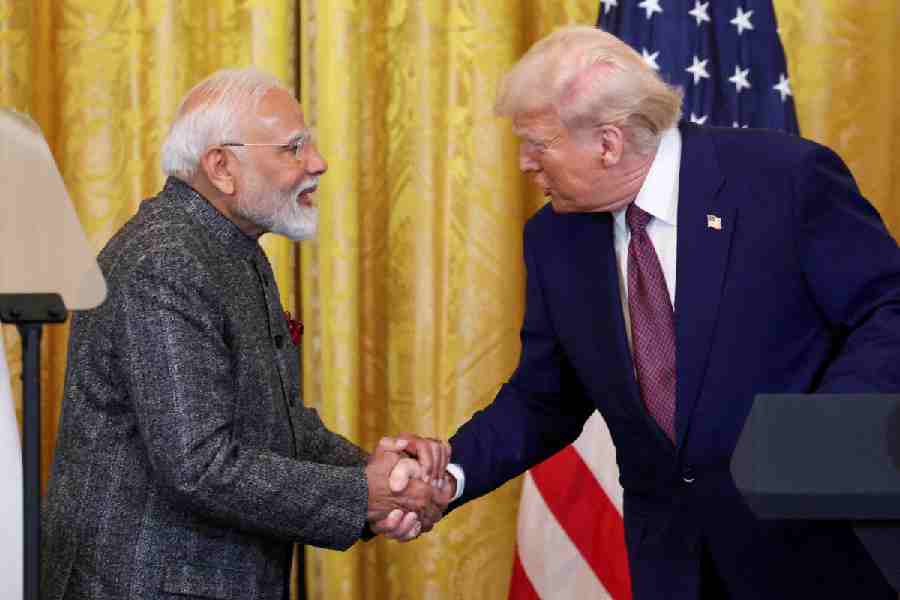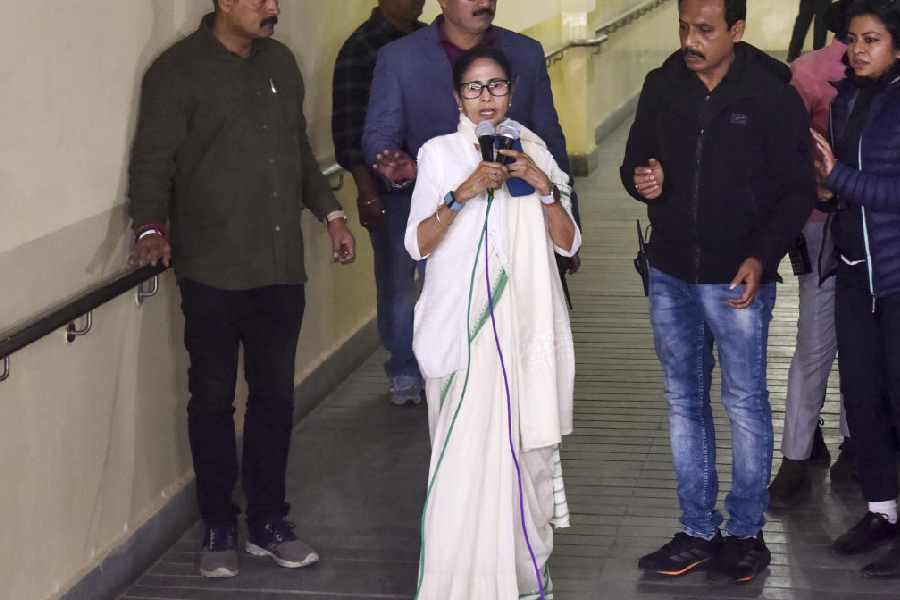New Delhi, Oct. 6: Former spy chief T.V. Rajeswar waited 32 years after retirement to chronicle his years at the Intelligence Bureau, India's domestic espionage agency, through the tumultuous 1970s and the early 1980s.
But asked in late September about the events detailed in his book, The Crucial Years, released on September 19, Rajeswar turned cautious almost instinctively, as though compelled by decades of training.
Yes, former Tamil Nadu chief minister M.G. Ramachandran had handed him what could have been a "missing" book chapter about a suspected romance between Indira Gandhi and one of her father Jawaharlal Nehru's closest aides, M.O. Mathai.
"But I can't be sure what the chapter had," Rajeswar, who headed the IB from 1980 to 1983, quickly added. "I never read that chapter."
Welcome to the birth pangs of a new trend. Rajeswar's book is the latest in a nascent genre of publications by former Indian intelligence officers that shed light on the country's otherwise opaque spy agencies that are not answerable even to Parliament.
Aided by a publishing boom and a growing debate about the powers the government should wield, these officers from the IB and the Research and Analysis Wing (RAW) - the external spy agency - have penned memoirs their seniors never dared write.
For some, the books also help the country appreciate the quiet but critical work spies perform for the nation.
Former RAW chief A.S. Dulat peeled some layers of secrecy off India's Kashmir policy under former Prime Minister Atal Bihari Vajpayee in his book Kashmir: The Vajpayee Years, co-authored by journalist Aditya Sinha and published in July this year.
Just a year ago, former RAW agent R.K. Yadav had detailed several instances of corruption and defection within the agency in his April 2014 book, Mission R&AW.
But these projects also capture an enduring tussle between the desire to reveal and worries about the consequences of letting out too much. While the state has receded compared to a few decades earlier, it has occasionally hit back.
Teasing readers with juicy anecdotes and personal experiences, these books confirm or reject suspicions surrounding key moments in India's recent past, yet contain few out-and-out operational secrets, both authors and publishers concede.
"The idea of these books isn't to sensationalise or reveal secrets," said Krishan Chopra, the editor at Harper Collins who commissioned both Dulat's and Rajeswar's books.
"The idea is to give readers a glimpse of how decisions were taken at key moments in our modern history in sensitive parts of the government."
Sworn to secrecy during their careers, Indian intelligence officers are forbidden to reveal anything that violates the Official Secrets Act even after retirement. However, they and their publishers are not required, officially, to get the content of their books vetted by the government.
"I'm a free citizen: I don't need anyone's permission to write my memoirs though I shall exercise my own judgement," Yadav said.
But falling foul of the government's reading of the secrecy law can have consequences, as the former RAW agent, Major General V.K. Singh, found out in 2007.
His book, India's External Intelligence: Secrets of RAW, was dubbed a breach of secrecy by the government, which tried to prosecute him.
Singh filed counter appeals with Delhi High Court, seeking a CBI inquiry into the allegations of corruption he had made in his book. The courts are still hearing these cases.
Rajeswar's book was ready almost two years ago, according to people familiar with the work, but he had it vetted by the home ministry.
A further wait ensued because Rajeswar's daughter Sujatha Singh was foreign secretary and it was decided not to launch the book while she was in office. She was removed as foreign secretary in January.
A second layer of self-restraint has bound all the Indian intelligence officers who have written a book: each has published his memoirs more than a decade after retiring, when the political and strategic implications of any revelations from their time have diminished.
Rajeswar, Dulat and Yadav have merely followed in the footsteps of Maloy Krishna Dhar, who with his 2000 book Mission to Pakistan broke Indian spies' till then self-imposed embargo against writing about their experiences.
Dhar, who served in Pakistan as an undercover agent in the 1960s and 1970s, later wrote a second book, Open Secrets, in 2005, revealing how the intelligence agencies had at times been misused by the government and individual officers.
Veteran RAW officer B. Raman, in his 2007 book The Kaoboys of R&AW - a reference to the team built by the agency's founding chief R.N. Kao - tried to explain the agency's mindset in tackling national security challenges.
But the trend is still new compared with other leading democracies that have a longer - though by no means smooth - history of former spies writing about their time as intelligence officers.
"It's a new and very positive trend," said Swaran Singh, professor of diplomacy and disarmament at Jawaharlal Nehru University, who has written about the traditional absence of transparency in India.
"We are still in the teething phase, and the response to some of these books shows we are still coming to terms with accepting multiple versions of the same event."
Former British spy Peter Wright revealed in his 1987 book Spycatcher how the MI6 -- Britain's external intelligence agency - worked with America's Central Intelligence Agency (CIA) to try and assassinate Egyptian President Gamal Abdel Nasser during the 1956 Suez Crisis. The British government lost court cases aimed at banning newspapers from publishing excerpts from Spycatcher.
In his 1975 book Inside the Company, former CIA officer Philip Agee named 250 fellow agents and gave details of the agency's operations in South America after the Cuban revolution.
America pressured Britain, where Agee lived at the time, into expelling him in 1977. After shuttling between Grenada, Nicaragua and eventually Germany, each of which gave him temporary asylum, he was eventually readmitted into the US. He chronicled this period in his 1987 autobiography On the Run.
Former CIA agent Felix Rodriguez's 1989 book, Shadow Warrior, confirmed the agency's hunt for Che Guevara two decades earlier.
More recently, multiple CIA chiefs - from Robert Gates, who headed the agency under Bill Clinton, to George Tenet, who oversaw preparations for the Afghanistan and Iraq wars - have penned memoirs. Leon Panetta, who served as CIA chief till 2011, joined them last year with Worthy Fights.
Gates, Tenet and Panetta got their drafts cleared by the US administration. Although the law does not explicitly require them to, authors and publishers in America usually do get any content on national security issues vetted.
Singh, the professor, said the recent trend in India was linked to the growing assertiveness of the middle classes - to which these intelligence officers belong - and their confidence that they can speak their mind.
"When the state was all-powerful in India, such as before liberalisation and privatisation, this was unthinkable," Singh said.
Authors have more options too. Delhi-based Manas Publications, much smaller in size than Harper Collins, published the books written by Yadav and Major General Singh.
These books are critical, Yadav said, to helping the country understand the role spooks play, quietly, in securing the nation, a contribution that he said often goes unrecognised in public.
It's the author's responsibility to check the facts. The publisher's lawyers then screen the book for any legal ramifications.
These books have been successful but not money-spinners. The original print orders for Rajeswar's and Dulat's books were for 5,000 copies. Dulat's book is now being reprinted for the fourth time.
Yadav's book had an initial print order for 3,000 copies. Manas proprietor Sumanlata Garg expects to have to order a reprint soon.
For the authors and publishers alike, the worries over the need to balance the revelations and the security concerns persist.
"Such books should focus on exposing wrongdoing and corruption," Yadav said. "There's no need to reveal secrets that can damage the national interest."
The publishers appear more willing to stand by their authors and their publications than in the past, the intelligence officers said.
"I think every officer should write at least one book on their time in service," said Garg, who insisted that her publishing brand remained undeterred by the government's pursuit of charges against one of its authors, Major General Singh.
The books give readers an insight into the secret workings of the government, but they also hold out lessons for the country as a whole, Chopra of Harper Collins argued.
"As a democracy, you've got to at some point sit back and say, 'Okay, we need to look at our past and learn from our mistakes'," Chopra said. "That's the only way you won't make those mistakes again."











